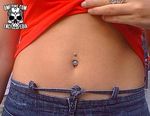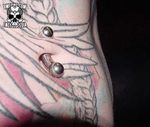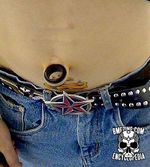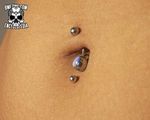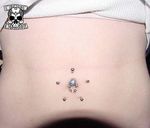Navel Piercing
A navel piercing is a piercing placed through the rim of the navel. This piercing can be done anywhere there is a defined fold or "lip," though some placements tend to be easier to heal than others. The most common placement is on the top ridge of the navel, followed by the inverse navel piercing, which is placed on the bottom ridge of the navel.
Ideally, a navel piercing is done an equal distance back from the centerline of the upper lip of the navel. If it is a shallow navel or a small lip, the inner placement is brought forward and a curved bar usually chosen for healing.
Even though it is one of the most common non-ear piercings, it can be surprisingly difficult to heal without good care; a navel piercing can take upwards of 12 months to heal completely. Even if it is kept clean and feels comfortable, it is still a long healer but not necessarily difficult.
Though most people are well suited for a navel piercing, there is one major exception: if the point your torso creases at runs through the navel (or close enough to put pressure on your jewelry when you bend over) you should NOT use a ring and in fact will probably be best off NOT getting this piercing at all.
This piercing was arguably popularized by Aerosmith.
Though quite rare, an "outie belly button" can also be pierced; it is called a true navel piercing. Regardless of the navel piercing you decide is right for you, make sure to research your piercer, and make sure that the studio and piercer you choose have extensive experience.
Regarding the history of the navel piercing, Paul King adds,
Though a bejewelled navel has been considered extremely erotic for hundreds of years, the actual piercing as a means of attaching the jewelry appears to be new. It was never considered a sign of royalty in Egypt as is commonly stated in body piercing myth. Perhaps at times, in various cultures, an individual experimenting may have performed this piercing, but no records or photos are known to exist prior to the mid to late 1970s. The media frenzy of this piercing from early 1992 marked the crossing over of body piercing into mainstream culture.
While most navels are done with curved barbells these days (along with captive bead rings), teardrop captive bead rings and J-bars are also popular.
Alternative Names
- Britney Piercing
- You think this is a joke, don't you? It's not. David from "Slave to the Needle" in Seattle writes,
Someone came into the shop tonight and asked for a "Britney." I didn't know what she meant until she said, "navel." That was the first (and hopefully only) time that's happened.
Related Risks

